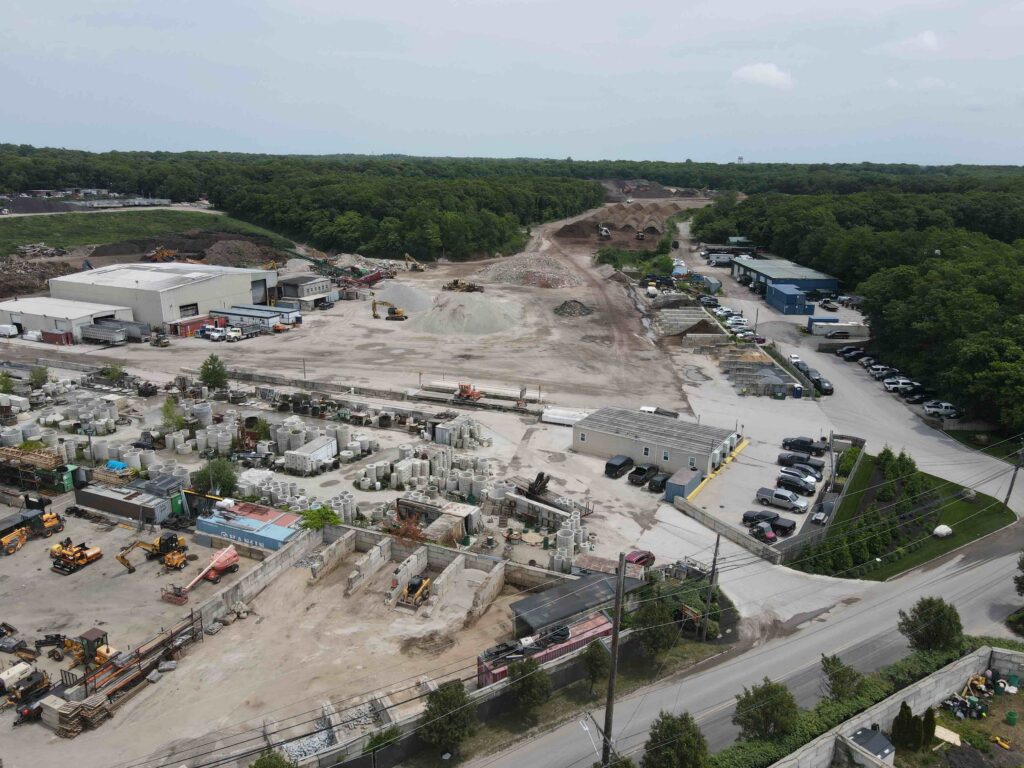Cover photo: An aerial view of the site in Kings Park (Credit – Town of Smithtown)
In the ongoing saga of the proposed Kings Park Rail Yard, a civic group has been denied their petition for the Surface Transportation Board (STB) to reconsider their decision granting construction and operation authority.
While no official application for the rail yard from the property owner Toby Carlson, President of Carlson Corp, Inc., various governmental agencies have their own requirements to be fulfilled before such an application could be submitted to the Town for their own review. Such requirements include Environmental Impact Statements (EIS), as well as multiple periods to accept public comment.
The Townline Civic Association, representing the communities along Townline Road at the Smithtown-Huntington border, has repeatedly protested the project, citing health concerns, property values, and quality-of-life issues, as has other members of the immediate area.
However, such a project would also afford Long Island an opportunity to offset the looming waste crisis with the closure of the Brookhaven landfill in Yaphank, slated for closure in 2027.
The project initially required environmental review from the STB, an independent federal agency that has oversight of railroads, freight train lines, railbanking, and some passenger line matters. The STB recently released a positive declaration, allowing the State Department of Environmental Conservation (DEC) to start their phase of oversight of the proposal.
The Townline Civic Association petitioned for the STB to reconsider their environmental review, which was denied.
The STB stated that the civic group “failed to present new evidence” to justify additional environmental review. Instead, the STB says, the group “reiterated previously addressed concerns, wasting time and resources.”
The civic group petitioned for a “Supplemental Environmental Assessment.” The STB ruled that their review concluded that the “project would have negligible impacts with proper mitigation.”
The STB also stated that the group’s assertions of groundwater contamination and hazardous spills were “unsubstantiated.” The STB found no hazardous materials within the project site and confirmed that spills occurred outside the 500-foot buffer zone. Furthermore, the STB classified Townline’s claims about illegal dumping as “speculative” and lacking “factual support.”

The STB also defended the State DEC, with the ruling adding that Townline “mischaracterized” the agency, adding that the DEC has monitored site reclamations for almost thirty years.
“The Association’s attempt to downplay NYSDEC’s role reveals either a lack of understanding or deliberate misrepresentation,” the ruling reads.
Finally, the STB denied Townline’s petition on the basis that their appeal is “wasting public resources.”
“By pursuing a petition based on recycled arguments, the Association has not only delayed meaningful progress but also diverted attention from the real environmental and economic benefits of the project,” reads the ruling.
In the ruling, the Board stated, “Inviting parties to seek reconsideration of every Board decision with which they disagree would create an untenable basis for reconsiderations.”
“The Townline Civic Association and surrounding neighbors who have voiced their concerns regarding the potential rail project, and the Old Northport Corridor have our utmost attention,” said the Town in a statement. “Rest assured that the Town of Smithtown will address every possible concern that they have and update the community as we receive information.”
The Town adds that the situation provides a “unique opportunity” for civic groups and residents to voice their concerns and submit their comments required by the extra layer of environmental review, in line with Townline’s wishes.
“In the coming months, the Town of Smithtown will issue a positive declaration for amendments to the town code associated with the updated Master Plan. This process will provide the Townline Civic Association and concerned citizens with an opportunity to submit their questions, concerns, and input into an Environmental Impact Statement (EIS),” said the Town in a statement.
The Town also stresses, however, that this EIS is separate from any potential Townline Rail application. The Town also believes an application is not expected to land on their desks in the foreseeable future.
“The purpose of this in-depth environmental review is to assess the impact of all Town Code amendments and updates recommended in the Comprehensive Master Plan. Additionally, this process provides an extra layer of study and review focused on potential environmental impacts to land, water, traffic safety, air quality, etc.,” said the Town.